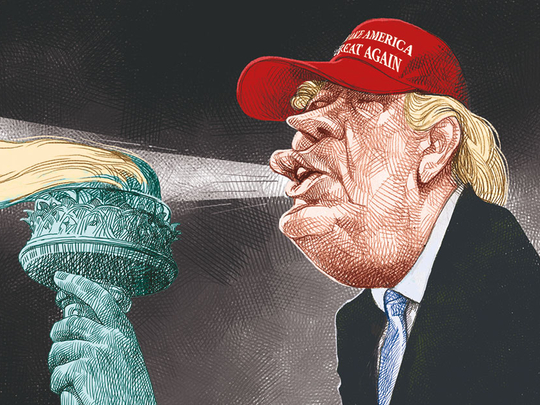
United States President Donald Trump thinks he can end birthright citizenship in the US by executive order: “It was always told to me that you needed a constitutional amendment. Guess what? You don’t,” he said in a recent interview.
Given the legal challenges Trump is likely to face — ending birthright citizenship would violate the 14th Amendment to the Constitution — many of the president’s critics suspect that the order is little more than a pre-election adrenalin shot for Trump’s base. If the order is so patently unconstitutional, the argument goes, what else could it be?
Yet, there are good reasons to believe that the proposed order is more than electoral theatre. The very extremity of the still-hypothetical order may serve to shift the terms of political engagement. Even if Trump fails in this attempt, simply trying could make it that much easier for the administration to impose future immigration restrictions.
This approach could play out in three interrelated ways. First, the arc of the American presidency bends towards enlarged powers. Second, even if unilateral executive reinterpretation of the Constitution is a bridge too far for Republican officeholders, Trump’s order could reshape the policy agenda on immigration. Finally, the act of putting birthright citizenship up for debate constitutes an assault on the dignity of millions of American citizens.
The scope of the presidency has developed through successive challenges to existing constitutional structures. The US Supreme Court has held that the use of presidential authority “must stem either from an act of Congress or from the Constitution itself”. But as political scientists Karen Orren and Stephen Skowronek put it, the contemporary presidency “has leveraged political mobilisation against the security of established rights”. In plain English, that means that if presidents can stimulate sufficient political support they can often overturn legal barriers. Sometimes, this expansion of presidential powers relies on a process of trial and error. For instance, the Trump administration learnt from losses in federal courts as it worked to secure judicial approval for its travel ban. It cost the president politically when courts overturned earlier versions of the ban. Yet, those reversals also taught the administration’s lawyers how to reassemble statutory and constitutional authority in a way that ultimately satisfied conservative jurists.
Of course birthright citizenship is less ambiguous than other legal issues. After all, there’s a bright line drawn in the 14th Amendment itself and Supreme Court precedent stretching back to the 1898 case of US vs Wong Kim Ark. Yet, even if one believes a 5-4 majority would never uphold Trump’s proposed executive order — and it might not — a failure could still help the administration’s lawyers craft a more legally acceptable, but still extreme, immigration policy.
Beyond the courts, Trump can affect public opinion and governance in other ways. Executive orders — like presidential rhetoric — can reset the policy agenda. In that regard, it’s important to note that Trump’s embrace of this cause is neither unusual nor novel. Some Republicans and conservatives have been critical of birthright citizenship for years, even floating the idea that an executive order could trigger a reinterpretation of the 14th Amendment. When he was a presidential candidate, Trump himself said that people born in the US to undocumented immigrants were not really citizens.
The real goal, though, may be to shift the conversation. Issuing an executive order that attempts to eliminate birthright citizenship would move the right edge of the immigration debate off the map. When something so patently unconstitutional seems even vaguely feasible, other highly restrictive immigration proposals from the 115th Congress would start to seem like calls for open borders. This could shift the political space in which immigration policy is debated. Even if the administration fails in that effort, simply having the president raise the possibility that there are different classes of citizenship can send a harmful signal. Other executive branch officials, as well as Border Patrol and immigration enforcement agents, will receive a worrisome message about how to treat vulnerable populations. It would be absurd to argue that Trump’s proposal to end birthright citizenship is legal. Lawyers and academics are also right to exercise caution when projecting the potential implications of Trump’s actions. Yet, to dismiss this action as a mere stunt is to dangerously understate its consequences. It is also to assume that the constraints on executive action are self-executing. By contrast, more than 200 years of history would suggest that there is a fearful level of flexibility in the presidency.
— Washington Post
Paul Musgrave is a professor at the University of Massachusetts, Amherst. Philip Rocco teaches Political Science at Marquette University.









